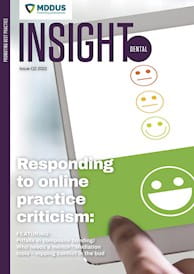 “DENTISTRY can be a lonely place.”
“DENTISTRY can be a lonely place.”
I recall a conversation with an accountant friend that ran along these lines: “I don’t envy you your day to day life Alun”. I presumed this was to be another one of those: “looking down in the mouth” attempts at humour, but I was mistaken.
He continued: “Every job or profession has challenges every day, but you have to solve the problems in front of you ‘now’. Not only that, you have a finite period of time and there may well be two or more equally taxing challenges sitting, waiting patiently for your attention.
“On the other hand,” he said, “I am able to close the file, think about it, wander down the corridor to one of my partners’ offices and ask advice. You don’t have that luxury.”
These words showed some insight into the great demands of dental practice, which can be classified under the headings of time, people and money. I am not seeking to deal with those today, except to emphasise the importance of accepting that you will have periods like he described. But if every day is like that then something really does need to change, either with the way you are working, or where you are working.
Not having all the answers
What I want to look at is the importance of having one, or more, mentors. The word mentor comes from Greek mythology, where Odysseus, off to fight the Trojans, leaves his son, Telemachus, under the care of a guardian called Mentor whose job was to protect and guide him. As it happens Mentor wasn’t really up to the job but the shape-shifting goddess Athena took his place and saved the day.
At different stages of our lives we all need someone to help us with challenges whether they are immediate, medium or long-term. That someone does not necessarily have to have all the answers, nor do they need to have an intimate knowledge of your situation. In fact for most of us, someone prescriptive, with a “do it my way” approach, is not what serves us best.
The element “ment” in mentor means mind, thinking or reflection. So a mentor is someone who stimulates another to think and a mentee one who is helped to think. I had very few clinical mentors as such, preferring to choose individual teachers from whom I could learn specific skills in patient treatment and management. I worked with specific coaches to help me establish and reach goals in my life, when appropriate.
Balance and sanity
My mentors were often not involved in dentistry but had faced challenges in their business and/or personal lives, had overcome them and kept their balance, or “stayed sane” as they sometimes put it. The lessons I learned from other businesses, professions and occupations helped me to gain and maintain perspective and broaden my outlook. Often the individuals involved had no real idea how much their sharing of experiences helped me, and continue to benefit me to this day.
The difficulties and challenges of day-to-day dentistry have not reduced in the years since I was a clinician. The pressure to be more immediate, faster and absolutely right in everything has increased or certainly feels as if it has increased.
Both sides of the coin
Often the temptation is to seek answers online but this can lead to further confusion or overwhelm from the multiplicity of opinions. Sometimes, inappropriate advice is doled out, whether you want it or not. Frequently it comes from this week’s “guru”, with something new to sell or purely to boost the ego of the teller.
The internet seems to polarise positions, where it appears that everyone else is either having the perfect life or a dreadful one. Avoid listening to both because the truth is somewhere in between. There is no one answer to all your problems, no magic wand to success or, in spite of the hype, no short-term, quick-fix, easy path to riches.
To return to “dentistry being a lonely place”: for all the talk of increasing amounts of teamwork, there still needs to be leaders who make decisions which affect others and who carry the can when there are failures. Life can be difficult as a principal, or an associate in a principal-led practice, but working as an associate in a corporate or chain can lead to greater challenges if there is no clinical lead to turn to for help. Trying to square the circle of personal responsibility without clear guidance and with a culture to which you have neither contributed nor fully engaged brings its own special complications.
The need for mentors or advisers who are trustworthy, independent of management and have sufficient experience to see both sides of the coin is essential in order to maintain both individuals and businesses on an even keel.
Alun K Rees is an experienced dental practice owner who works as a coach, consultant, troubleshooter, analyst, speaker, writer and broadcaster. Find out more at www.dentalbusinesscoach.co.uk
This page was correct at the time of publication. Any guidance is intended as general guidance for members only. If you are a member and need specific advice relating to your own circumstances, please contact one of our advisers.
Read more from this issue of Insight Dental

Save this article
Save this article to a list of favourite articles which members can access in their account.
Save to library